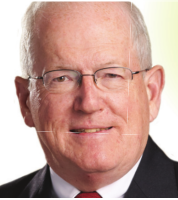UNH grad’s app seeks to fill ‘social infrastructure’ gaps amid Covid
The New Hampshire Department of Education recently announced an innovative way to try to reach young people of the state where they live: on handheld devices and through social media.
Education Commissioner Frank Edelblut, a sometimes controversial, but always energetic, official, announced the initiative of his department’s Office of Student Wellness to launch an “evidence-based resilience cultivation platform, NextStep GoodLife.”
By providing this app, it is hoped students struggling with mental health issues, depression and the like, or are tempted by substance abuse, will have a tool to allow them to cope, develop new skills for healthy living, and have access to alternatives to succumb to the temptations of substance abuse or sink deeper into mental health issues without getting help.
The app, as advertised, will provide opportunities for students to set goals for fitness, nutrition, social engagements of the right kind and self-awareness needed to seek to fulfill those goals. It allows them to create and join others in groups with similar interests, whether music, sports, food, outdoor activities, animals or other things. Students can share videos of their activities, positive messages encouraging positive actions and see the stories created by others, as examples of how to act productively.
Sam Warach, a young UNH graduate, founded NextStep Health Tech (which came up with the GoodLife app) after losing a brother after a prescription drug issue gone wrong. He runs the program in partnership with the department from his office in Durham, and many of his colleagues are fellow UNH alumni. After UNH, he became a Stanford University Innovation Fellow, and kept developing the tool there.
The program has partnerships with the New York City public schools and the Clinton Foundation, to name but two. Nextstepgoodlife.com is where to look on the web.
In announcing the program, the commissioner’s office said “GoodLife is designed to harness the power and connectivity of social media to build adolescent resilience, equipping young people to tackle anxiety, negativity and a host of other areas that can derail a young person, both online and in person.”
The app uses information from scientific research on how to attract young people and is based on “40 Developmental Assets for Adolescents,” which is a “list of researchbased, positive experiences and qualities that positively influence young people’s development, helping them become caring, responsible and productive adults.
“The application anonymizes the identity of users, and does not collect any personally-identifiable information,” according to the Department of Education.
Warach said, at the time of the announcement, “We combine
evidence-based research with empathetic design and gamification to meet
youth where they already are — on their mobile devices — at a time when
traditional education models and social infrastructure have been
disrupted globally.”
Now, while this UNH grad, from
roughly 47 years prior to when Mr. Warach was graduated, may never have
heard the words “anonymizes” or “gamification” prior to reading the
press release, he is proud that the university has produced someone,
along with other young alumni, who not only have produced something
which promises to be of great value to other young people following
them, but also is proud that this has caught the attention and
imagination of the Department of Education, as providing the potential
for a nontraditional service to be put in the hands of parents,
guardians, students and educators.
The
next step for NextStep GoodLife is to publicize the availability of the
application so that it gets wide acceptance and use among adolescents
in New Hampshire and beyond. Certainly, it is not a substitute for
school-based learning, but in a time of continued disruption of normal
systems of instruction or after-school activities, it promises to help
many who may feel adrift and alone.
Sam
Warach, Frank Edelblut and the New Hampshire Department of Education
deserve credit for the creativity displayed in this effort. Everyone
reading this article, whether parents, students, teachers or not, has a
lot invested in the success of our young people, and the one or two-year
disruption in their normal education should be a concern for all of us.
It is worthwhile for everyone to look at the website and to invite
young people to download the app, which is free through the Apple App
Store or Google Play, and to let the youth and educators in their
communities know about it, too.
Watch for more publicity about this coming soon!
Brad Cook is a Manchester attorney. The views expressed in this column are his own. He can be reached at bradfordcook01@gmail.com.